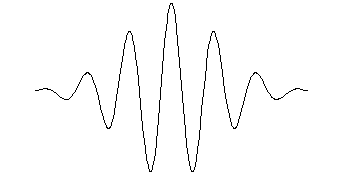
Introduction to Quantum Mechanics
(Crosslisted as Physics 407 and Chem 323)

Professor: Gabe Spalding
Course Description:
- This course introduces the central principles underlying the behavior of systems at the atomic scale.
- Topics include: Experimental basis of quantum mechanics; wave-particle duality; Schrödinger's equation and solutions in one-dimension; time dependence of quantum states; two- and three- dimensional quantum, angular momentum; solving Schrödinger's equation for one-electron atoms (the periodic table), alternative basis sets, exchange, and perturbation theory. We will also discuss symmetry, causality, and measurement theory. Mathematica will be used, both for student assignments and in-class demonstrations.
Textbooks:
Other (Key) Readings: (These useful sources are on reserve in Sheean Library)
French and Taylor, An Introduction to Quantum Physics. -- This offers the sort of verbal descriptions that are sometimes lacking in the primary text.
Eisberg & Resnick, Quantum Physics of Atoms, Molecules, Solids, Nuclei, and Particles (This contains REQUIRED reading for the last third of the course)
Morrison, Estle, and Lane, Quantum States of Atoms, Molecules, and Solids
Feynman, QED: The Strange Theory of Light & Matter
Baggott, The Meaning of Quantum Theory
Course Organization
- Class Meetings will be at 2:00 - 2:50 on Mondays, Wednesdays, and Fridays; attendence is expected.
- There will be four hours of testing during the term.
- Extra credit will be given for outside reading. (Please read through my list of potential topics)
- Homework assignments will consist of group problems and individual problems. The latter are not as difficult, but must be done without consultation with other students; you may discuss them with the instructor (either in person or by e-mail) or consult other written sources.
- Each homework assignment turned in should include verbal comments on the physics of the assignment. I just want you to develop good habits of communication: you must include brief comments which show that you've thought about your work (rather than merely plugged and chugged), and which clarify (and extend) the conclusions you draw from your results.
- Some of our meetings will be devoted to discussion of the homework. At this time students may be asked to present solutions to homework problems at the board. Not everyone will be assigned the same homework problems, but because you will be given solutions and will have the opportunity to discuss each problem during such recitations, you each will be held responsible for every problem assigned.
- A written copy of your work on homework assignments must be turned at the start of class on the day due. If you borrow your homework back for presentation during class, please don't forget to turn it back in before sitting down.
- Matters of Honor - The instructor values our student honor code for the integrity it fosters and the pedagogical flexibility it affords. The important guiding principle of academic honesty is that you must never represent the work of others as your own. Just copying someone else's work is clearly a representation of another's work as your own, and is a violation of the community. The following guidelines should govern your behavior in the course; please request clarification if you find yourself in any doubtful situations.